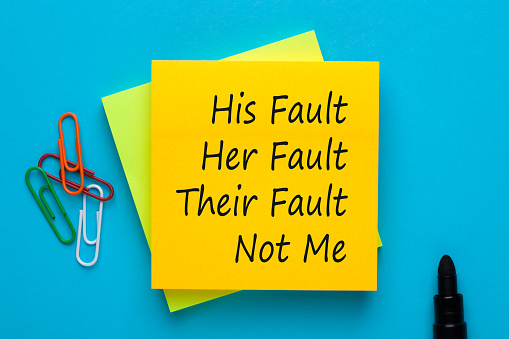I remember a funny incident from the past, wherein my year old niece ate some candies in spite of being told otherwise. On being questioned, she innocently told us, that her teddybear pushed her into eating the candies. Now after years to that incident, on deliberation, I discern how as an adult we still practice projection so seriously in our daily lives. Projecting onto others has become an acceptable norm. So what is Projection? it is defined as a defense mechanism in which the ego defends itself against unconscious impulses or qualities by denying their existence in themselves and by attributing them to others, events or environment.Projecting is an innate characteristic of a personality disorder named Narcissistic Personality Disorder (NPD).They are also called blamers.

Blamers are all around and can come in all the different forms, a friend of yours who has never grown out of his mishap happened in childhood, a cousin of yours who is self absorbed, an office colleague who has a sob story to avoid doing his work or overly critical family member. No matter who they are, but this kind of person single-handedly dents your happy self, damages your confidence with their remark, twists your good news into bad news in seconds, make a happy, person depressed, and they generally just make life miserable of everyone around. They have aversion to other’s happiness and instantly turn it into bad atmosphere by their biting remarks.One of my senior office colleague has this scathing habit of demeaning people and spoiling their moment with her biting remarks. For instance, if anyone wears a new attire, she would touch the fabric and comment, I had the same dress, better quality and expensive which I gave it to the maid. This behaviour is toxic and dealing with such people is nothing less than harassment.
As a society at large, we have embraced projection (blaming) to an extent that blamers conveniently shirk their responsibilities onto others and steers on into damaging others. It is imperative that we identify blamers and strive to stand up against their atrocities.
How to identify blamers
- Blamers never take responsibility of their actions whatsoever
- They have aversion to change and likes to be in control
- They are self absorbed and can never think beyond themselves. Their needs are of utmost importance and that’s how they like people around them to believe it.
- They usually have nothing good to say about others and are super critical. Their cheap thrill is destroying other’s moments
- Their actions can be deemed as immature and shortsighted
- They have this distinguish characteristic of exaggerating their success or failure. It is always one big story they have that beats everyone’s experience.
- They always have their way in just everything and it usually involves manipulation, scheming or emotional exploitation.
- For them every relationship is a means to their ends, completely oblivious of other’s sentiments.
- They have this innate belief of never being wrong and it’s impossible for them to accept their mistakes
- Importantly, every interaction with them makes you feel awful or leaves a bad taste in your mouth
- Another thing, their self high handedness would never let you challenge them. They are equipped to deal with emotions for their benefit and will more often than not, will use them to instill guilt.
It is absolute unfortunate to be subjected to one.But again, we hardly have control to it however we can incorporate mechanisms to alleviate the impact.
How to deal with blamers
- When dealing with blamers, ensure that you are using your rational mind compared to emotional mind. Meaning, you have to keep a check on your emotions and rationalize their actions vis a vis your actions.
- Never take a blamer on their face value. Accept the fact that “what you see is not what you get”. They always fall short of fulfilling their tall claims of being around. Hence never trust them
- Refrain yourself from getting into an argument, explanation or being defensive with blamers and avoid confronting them as they will devoid you of your peace of mind.
- Acknowledge their personality disorder and don’t let them influence you in anyway. Limit your interaction to minimal and nurse yourself when hurled with scathing remarks. Remember they need help not you so keep your self esteem intact.
- Avoid giving suggestions/advice to them as sooner or later you would be blamed for the repercussions.
- Lastly, never trust them. They can go to lengths to prove themselves right or to retaliate with an intention of destroying you.
Concluding with the famous words of Robert Kioysaki, “When people are lame they love to blame”. Understand, there is a reason why it is called a personality disorder and is recommended for help.The little we can do is to acknowledge and educate people so that they don’t get victimized by any blamer.